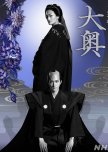
A Quality Survival Show
The Nizi Project is a survival show made in collaboration by JYP Entertainment and Sony Music Japan to create a "global" girl group by which they mean a Japanese girl group that they hope to market internationally. The idea is to create a J-Pop group using the training methods, aesthetics, and standards of K-Pop. This 10 episode series is the first of two which resulted in the creation of the group NiziU ("Needs(y) You"). This first series is mostly set in Japan and covers auditions in 8 cities in Japan, an audition in Hawaii and one in Los Angeles as well as a subsequent elimination process to select a group of trainees to be sent to Seoul for the second series of the show.The host and only vote which matters for this show is JYP himself, Park Jin-Young. He does take care to listen to his staff, but at each step of the process, it's pretty clear that he is the one who will be making the decisions, and, ultimately, choosing who will go on to Seoul for training (and, in the second series, who will be in NiziU).
Each of the women who pass the audition episodes are given a necklace with four slots for bedazzled puzzle pieces. Filling all four slots will result in the women being sent to Seoul, but the gimmick is pretty pointless since JYP can grant additional puzzle pieces to the women pretty much whenever he wants to. The necklace does, however, serve to frame for the viewers the four abilities that the women are to be judged upon throughout both series: singing, dancing, variety show skills and likability/cooperation/discipline.
Unlike many shows in this genre, the focus is almost entirely on preparation and performance. Very little time is spent on the women's background stories, dorm-room interactions or variety show games. Furthermore, I do not believe there were any product placement segments at all (other than the music used for the performances - you will hear a lot of JYPE's TWICE and ITZY) in either series.
JYP is charismatic and knowledgeable, but he can be capricious in his criticism occasionally lambasting the individuals for being outside the narrow scope of what he considers the essential standards of K idols even when the performances are good.
The candidates themselves are the usual mixture of pop-star wannabes of various levels of skill and and training with a few ringers who have already been training at JYPE for years. There is not much tension for a few of the women who probably should have debuted a year or two ago, but, nevertheless, it is very fun to meet all the candidates and see what they can do.
The fact that there are no live audiences and no viewer input whatsoever is probably why this is one of the best singing competition shows ever produced. There can be no accusations of vote rigging or producer manipulation of audience voting via wildly disparate allocation of screen-time when there is only one voter who is not even seeing the final edit of the show. If you always wanted a singing and dance competition where the focus is entirely on, you know, the singing and the dance, then this is the show for you.
Cet avis était-il utile?

Sono “Okodawari”, Watashi ni mo Kure yo!!
2 personnes ont trouvé cette critique utile
It's mostly cringe humor a la The Office or Christopher Guest films like A Mighty Wind or Waiting For Guffman. It's unclear the extent to which the scenes are improvised, but they might well be. You might think after you've watched the first four episodes, that you know how this show will go with each episode featuring a different strange obsessive, but then the series becomes more about Matsuoka and Ito's approach to the show and life in general and begins to tackle themes of how people create personas for themselves on screen and what it means to be authentic in the kinds of bizarre and scripted situations that crop up on variety shows. And the show does so while largely staying funny.
There are some mild twists, and a really silly denouement. There are a couple of plot points that are made and then immediately forgotten about. I'm not quite sure that it nails the landing or satisfactorily concludes its theses, but the mere fact that it attempts to address the issues of persona and performance in variety shows is surprising and interesting.
Under-girding the whole show is the delightful chemistry between Matsuoka and Ito. Who knows if they are as close friends in the "real world" but the friendship as its portrayed feels authentic, and provides a lovely foundation for the show.
It's a show that has not had many viewers, but is, nevertheless, well worth checking out.
Cet avis était-il utile?

An Interesting Alt History of Edo Period Japan
I will preface this review by saying I have not read the manga which ran for 17 years, nor watched this year's anime on Netflix, nor seen the prior drama series from 2010, nor the prior two movies. I imagine that one's experience of this series could vary widely based on how much of the prior material you have encountered.The premise of this drama is that Japan experienced an on-going plague starting in the reign of 3rd Tokugawa Shogun in the early 1600s that reduces the population of men to one quarter of that of women. Thus, part of what Ooku explores, in general, is what that change in demographics might mean to the roles of men and women. What would Edo-period Japan have been like if women were in charge?
This drama is roughly divided into three chunks covering incidents in the lives of the woman who took over the role of the 3rd Shogun, and then 5th and 8th Shogun. The 8th Shogun serves as wrapper for all the episodes as she reads about the lives of these prior two Shoguns. The manga continued through the 14th Shogun, and so this drama does not attempt to cover the entire run of the manga, and, indeed, one presumes Season 2 will cover more of underlying material. Nevertheless, this series (like many other manga and novel adaptations) does suffer a bit from trying to cover too much of the original material.
The cast is huge and the production fairly lavish though we comparatively rarely see what life is like outside of the Shogunal residence in Edo. Like many Roman and Chinese emperors, the Japanese Shoguns in this period seem to be fairly isolated within a system meant to protect them and insure the continuation of their dynasties. And, indeed, the Ooku was the quarters for the Shogun's concubines during the Edo period, and so becomes the quarters for the male concubines in this alternative history, and so part of what the series explores why and how men come to serve as concubines, and how the system works (and sometimes fails) to produce heirs to the Shogun.
The series does address some interesting and perhaps surprising issues over the course of this season, but I do think the quality and interest of the three sections are fairly even though they cover entirely different themes and have have mostly different casts of characters. There are some striking moments scattered throughout the series, and the performances vary from solidly professional to quite good. If you enjoy alternative histories and Japanese period dramas, it's well worth watching.
Cet avis était-il utile?

Sono Bisque Doll wa Koi wo Suru
1 personnes ont trouvé cette critique utile
A Good, Solid High School Romance
I have not read the manga nor seen the anime, and so I cannot speak to the faithfulness of this adaptation. Nevertheless, this live action series is better than I expected. It is a very typical high school romance given a bit more life than usual through by focusing on the two leads entering the world of cosplay, and by the performances of its two young leads, Nagase Riko and Nomura Kota.Nomura's Wakana is shy and introverted, and so I'm sure you'll be shocked to learn that Nagase's Marin is outgoing and and extroverted. The roots of Wakana's social isolation is absolutely absurd - he was teased as a youngster for liking dolls which, you know, gender stereotypes, but the thing is that his family's business is handcrafting ... dolls and so you'd think at some point before his second year of high school he'd have mentioned that fact to, I don't know, ANYONE AROUND HIM, and accepted and owned the fact that he likes making them. Instead, we have Marin breaking into his bubble of isolation to avail herself of his sewing skills as she begins to explore her new interest in cosplay.
An uncharitable reading of this series might be that Marin is just yet another MPDG dragging a socially delayed Wakana out into something like a wider range of interests and social interactions. And as always YMMV as Marin perpetually grins and invades everyone's personal space in what I assume is genkiness straight from the pages of the manga. But I do think these tired tropes are redeemed a bit by what's happening romantically within the characters, and the fact that the resolution (at least in this season) is not exactly what you might expect given the set up.
Both Wakana and Marin have very small families for reasons that are never touched upon let alone explained: Wakana is being raised by one of his grandfathers, and Marin is largely living alone occasionally visited by her father who is frequently away on business. The series thus focusses entirely on the joint creative adventures that the two share as Wakana makes costumes for Marin. And I do think the series shines as Wakana discovers that his skills are valued in that community and as Marin receives well-deserved attention for her presentation and performances of the characters she loves and brings to life. And I do think both Nagase and Nomura portray their enjoyment of this shared interest quite well.
I also must shout out Ikeda Akana in the small secondary role of Sajuna, a more experienced cosplayer. She plays the role with a very deft deadpan that brings an unexpected and much-needed touch of humor to the series.
My one slight, genuine negative note about the series is purely cinematographic. The production clearly intentionally went for a wide-aperture, utterly washed out look throughout the series. Were they trying to hide acne on the young actors? Neither Nagase nor Nomura seem to need that. Were they avoiding having to clean up exteriors for the MANY shots of the characters backlit by bright windows? Who knows, but at times the feel of the series is that all of this is taking place on the surface of the sun.
But that niggle aside, I do recommend this series as a light high school romedy that does not have much to say, but is a cheerful diversion nonetheless.
Cet avis était-il utile?

Welcome to Planet Sutherland
1 personnes ont trouvé cette critique utile
A Chill Sci-fi Web Series Available On YouTube
Three aliens from billions of light years away on the planet Skuld land in Tateyama, Japan having intended to land in Southerland, Scotland. They are beings of pure data and are here to learn about Earth and meet Remi, a part-time property manager, and her friend Ryo. The brief episodes touch upon life and love and art from the three's alien perspective. The stakes remain relatively low throughout, and the script could use some tightening. But the performances are good from the young cast, and the drama is quite well shot and edited. The series is ultimately sweet, but probably not all that memorable.Cet avis était-il utile?

Youkai Sharehouse: The Movie
1 personnes ont trouvé cette critique utile
More Yokai Sharehouse
If you've seen the previous two series, then you know the drill. Mio struggles with self esteem while saving the world with her loyalty and steadfastness and, of course, the support of the monsters in her sharehouse. I strongly disliked S2 because it immediately undid all her character growth from S1, and never even brought her back to the same level of maturity she reached at the end of S1. However, the movie here is somewhere in between the two seasons for me in terms of how much I enjoyed it. It's framed around a topical albeit tepid plot about how AI might reshape our world, and kudos for getting this movie out maybe 9 months after the news about chatGPT and AI art generators were breaking news.All the usual suspects are here in addition to the five principal characters. Many of the major secondary youkai from the series show up for at least a cameo. The acting remains broad and OTT like the prior series, but Koshiba as Mio anchors the chaos as always and has some moments to shine. The new ML for the movie, Mochizuki Ayumu as Aito, does as well as one could expect in the tropey AI learns what it means to be human role.
If you liked either of the previous series, it is worth checking out, IMO. And if you just want to sample the world, it is comparatively standalone, though personally I would recommend the first season over it.
Cet avis était-il utile?

Home Raretai Boku no Moso Gohan
1 personnes ont trouvé cette critique utile
Slightly sweet, slightly sad but very formulaic
Wada Masao is the bass player for the popular rock fusion group Gesu no Kiwami Otome under the stage name Kyūjitsu Kachō (Weekend Manager). In 2018 he appeared on the Netflix reality show Terrace House for the end of its Opening New Doors series where he wooed one of the housemates by making his clam curry for her. In 2020 he released a cookbook which formed the basis for this series.Each episode follows the same structure. The show begins with a cold open of the young salary man Wada Masao at work or rehearsing with his band. He then goes to the local grocery when its about to close where he encounters a sales clerk and a stock boy (played by the real Wada Masao who has, maybe at stretch, a dozen lines over the course of the series). Back at home he prepares a meal. Most of the ingredients and timings are mentioned, but I'm doubtful that these scenes would suffice for someone to execute the recipes. At that point, a woman who he has encountered recently appears at his apartment, eats the meal with him and praises his cooking ... and then disappears because these nightly fantasies are all he has going at this point. He then calls his childhood friend Tomoko who is working in New York and there are some final credit scenes with his band or work.
So, in part, this series is about the formation of Gesu no Kiwami Otome. (The diegetic music played by the band is a couple of their songs though Masao's other band Dadaray provides the title and credit tracks for the series.) And, in part, the series is about Masao becoming more assertive, deciding what he wants to do with his life and choosing between a conventional work life and pursuing music more seriously. The series has a few good moments and the last couple of episodes work quite well. The acting is mostly understated and the vibe of the series is quite chill. (You were expecting action scenes in a series based on a cookbook?) All in all, I found the series mildly enjoyable, and the series ends with a nice little crescendo.
Cet avis était-il utile?

Sakamoto Yuji's Version of a Chinese Classic
It is surprising that this series is not well known or remembered - it was the most viewed Jdrama on broadcast TV in Japan for all of 2006, is based on an extremely well-known classic of Chinese literature and was written by one of Japan's best screenwriters, Sakamoto Yuji. Part of the reason, undoubtedly, is that it is pitched towards an age range that would be watching and enjoying Power Rangers or Kamen Rider with lots of broad acting, obligatory climactic fight scenes, fart jokes and a surprising amount of male urination. It's almost certainly not the best version of Journey To The West of the last few decades (Steven Chow's first film deconstruction of the story probably takes that crown), but it is a good, wholesome take on the old Buddhist children's story with some unexpected twists along the way.At eleven episodes Saiyuuki is a comparatively brief version of these tales, and, thus, this series skips the origin story of Goku (the Monkey King) and starts with the Japanese version of Tripikata, Sanzo Hoshi, freeing Goku from his 500 years of imprisonment in a rock and the Avenger team of Sa Gojo (Brother Sand) and Cho Hakkai (Brother Pig) already assembled for the journey. Each episode tells the story of the group encountering a demon along the way and overcoming the corresponding challenge with most of the encounters invented for this version (I'm pretty sure, for instance, there was no chapter involving time travel when I read a translation of the books). As is usual, for this series the group seeks to reach a sacred mountain, meet an incarnation of the Buddha and receive sacred scriptures, and no time is spent at all on the return to Chang'an.
Like the famous Japanese version from 1978 (the actor who played Goku in that version, Masski Sakai, appears here in the final episode as the Buddha), Sanzo Hoshi is played by a woman (in this case, Fukatsu Eri) but given he/him pronouns (at least in the version of the subs I watched). As in most versions of Journey To The West, Sanzo Hoshi is repeatedly captured and rescued by the rest of the troupe, but Sakamoto does give the character a bit more agency than usual. Sakamoto also adds an entirely noncanonical character in the form of a female thief, Rinrin, whose path intersects that of the travelers and ultimately becomes one of the team. Rinrin played by Mizukawa Asami is probably one of the best reasons to check out this version of the tale by providing a good, bantering foil and general competence in contrast to the impulsiveness of Goku.
Goku, as usual, is the focus of series, and is played by Katori Shingo who plays the Monkey King as kind of a blustering dumb jock/warrior but with some nice, quieter empathetic moments as well. Most episodes end with a fight scene where Goku's staff ultimately comes down on the head of the demon of the week who is then carted off to hell by a markedly breast-obsessed Taoist deity, Roushi (Lao Tzu) played by Okura Koji.
The 2006 version of Saiyuuki is a broad, largely comedic children's show with some nice lessons about working together and acceptance. Nevertheless, there are some surprisingly strong emotional beats along the way. It is probably worth seeking out, particularly if you enjoy Sakamoto's other series.
Cet avis était-il utile?

Cet avis était-il utile?

One of the weakest asadoras in the past decade
Mai Agare! was the winter asadora which started in the fourth quarter of 2022, and is the fictional account (as opposed to a fictionalized biography) of Mai who aspires to soar into the sky. She makes a lot of progress towards doing so in the first half of the series in which she grows up and heads to college where she becomes the pilot for a club which works on building human-powered aircraft, and then shifts to flight school where she successfully graduates and is all set to become a commercial pilot in Japan.And so, naturally, at that point the script turns abruptly from the exciting world of piloting to ... the manufacturing of screws and the plight of small production factories in Osaka.
Look. I'll spare you all the details, but I'm entirely the target audience for the second half. My Dad engineered parts for the B1 bomber in the 70s and the Boeing 767 and 777 jets in the 90s. He had his name on several process patents for the use of titanium. I have written tons of poetry. All of those things touch directly on plot points in this series. I should be the one person who should be eating up everything being served by this series in the second half, but let me tell you: the storylines in the second half are ... just ... so ... boring.
The scripts also suffers from tepid or nonexistent resolutions to many of the running story arcs. Are the Goto islanders able to recruit young people to establish lives in the islands and revitalize the community? Does Mai's brother face any real long-term consequences for his illegal investment activities? Can Takashi overcome his writer's block? Can local Osaka machine shops and factories band together to bring in more business opportunities? The answers will not surprise you, and are presented in ways that might well be a cure for your insomnia.
As other reviewers have noted, there also seemed to be real issues in the production budgeting for this series with no expenses being spared for the first half including at least one aircraft apparently specifically built for the production and lots of shots on location at a fight school and also at the reasonably distant Goto islands. After that the story is stuck in a handful of sets including the Iwakura family house which miraculously expands as needed over time. They splurged a bit more for the final two weeks where they still mostly skip over what would probably be a much more interesting plot than the rest of the second half with a couple of multiyear time jumps.
On the other hand, the cast consists of good, solid acting professionals doing what they can with the material. I have enjoyed Fukuhara Haruka in several other things, and would even recommend her turn in her two seasons of the live action Yuru Camp even though those series have even less plot than this one. Here she plays Mai as persistent and cheerful, and she handles the narrow range of emotions required for the role perfectly well. She has little to no chemistry with either of her love interests, but, to be fair, all sexual chemistry is apparently against the asadora style guide in general.
If you enjoy the asadora format, this series is one. If you've never tried an asadora, there are many I would recommend before watching this one with Amachan still being the best pure fiction series and the recent Tora ni Tsubasa being the best fictionalized biography in my experience and opinion.
Cet avis était-il utile?

Non's Sophomore Effort Is Slow But Charming
This is Non's second film, and this time she "only" wrote, directed, edited and starred in it. It's an art film about art which is always dicey territory, but Non manages to keep the story from being pretentious or self-indulgent by grounding the narrative in the mundane lives of its characters while limiting her representations of the impulses of creativity to brief but necessary moments of cgi and practical images of ribbons.Set at the beginning of the COVID pandemic, it captures the stress of the time and the way it forced us to isolate. Here the stress is compounded for Non's character Itsuka and her friend Hirai as their art school is being put on hiatus right before their graduation and their final projects and exhibitions are canceled. Itsuka shelters in her apartment alone and utterly fails to find a way to continue painting even though she routinely had done so there in the past. It is a story about reconnecting to that creative impulse through the not always welcome intrusions of friends and family.
The film has a larger budget than her first film, Get To The Punchline, and her editorial skills have improved, but the film is a bit slow and probably does not merit it's 2 hour runtime. That being said, it has some solidly funny moments, a beautifully moving climax and a satisfying denouement. The cast is solid and Non exhibits a greater range as an actress than she has in her prior roles.
All in all, it's a good journeyman effort and a surprisingly satisfying next step for this interesting young filmmaker.
Cet avis était-il utile?

The agency is presented as a quirky and mildly dysfunctional little family that works pretty diligently to keep the business going and the girls safe. The characters at the office are reasonably likable and the actors do a decent job with the material they are given. The story of the day-to-day operations of the agency seems to be a reasonably sober and accurate if slightly gritty depiction of this side of the sex industry in Japan. There is a bit of humor that does land throughout the series, and rather more banjo in the soundtrack than one might expect.
The show is fairly sex-positive but the tone of the production is definitely not approving of the call-girl business in general. Nor is there any fan service here: the women and what they do with their clients is presented in a matter-of-fact manner, and while several gorgeous actresses are part of the cast, they are not presented for the male gaze even in scenes with their clients.
The failure of the series is inherent in its set-up: the show is about Sakita coming to terms with his new job. The arc of the series centers on his repeated failures to be a white knight for the woman at his agency. And so while two of the women he works with are almost certainly raped (trigger warnings for episodes 3 and 12), two of them are kidnapped, and one is physically abused at a rival agency the story only focuses on how those incidents affect him. I think we're supposed to be cheering the fact that Sakita genuinely cares for the women he works with but the series itself really does not.
Cet avis était-il utile?

Love Live! School Idol Musical the Drama
0 personnes ont trouvé cette critique utile
A short, light but enjoyable mess
The Love Live! franchise is a set of projects running since 2010 that include over 50 issues of manga, 4 anime series, 3 anime movies, games, apps, novels, live music events and a stage musical. I have seen none of those, and fans of the various projects would certainly know more of the context, but my impression is that there is little to no continuity between the projects and the common thread is that they are all about girl idol groups formed as school clubs in high school and aiming to participate in an annual performance event called "Love Live!" This series is the first live action television drama of the franchise and is based on the 2022 stage musical.The protagonist of this series is Rurika who is the daughter of the principal of the prestigious, academically focused Tsubakisakka Girls' High School. Under the pressure of her mother's watchful eye, she's current #2 in the weekly tests, but she has gotten a dream to become an idol which could start by forming an idol club at her school. Meanwhile, Anzu is the daughter of the principal of a new and trending performing arts high school, the Takizakura Girls' Academy. Anzu is the center of Takizakura's successful idol group which is about to have its major label debut. However, while Anzu's the ace of her group, her being an idol is more her mother's dream than hers.
None of the major plot points in this short series make any sense at all, and the characters are all tired tropes and archetypes of the genre. But, to be fair, the whole franchise seems to be squarely pitched towards tweens. Despite Love in the title there is no romance anywhere, it's certainly in no ways near a GL, and there are no named speaking roles for any males.
The series is also not really a musical in the sense that the actors do not have any non-diegetic songs. There are a few typical idol songs throughout the series, but they are all sung at practice or performances.
Despite it's obvious flaws, I found the watch light and enjoyable. Rurika is played by Watanabe Miho, a former member of the idol group Hinatazaka46, and the character charmingly pressures all her friends to join her in her dream of being an idol. Anzu is played by Tomita Nanaka, the current center of the idol group ≠ME, and she does what she can with a character whose actions do not make a whole lot of sense. The acting overall is pretty broad, and the stakes are fairly absurd. But somewhere in there is a message about how the best idol group is the friends we made along the way.
Cet avis était-il utile?

Dai Kaiju no Ato Shimatsu
0 personnes ont trouvé cette critique utile
Mostly Forgettable
What to Do with the Dead Kaiju is a parody of kaiju movies in general and a couple of the most well known franchises in that genre in particular. The premise is pretty solid: a large reptilian kaiju has just stomped through Tokyo and died at the mouth of a river and the government neither knows why it died nor what to do with the resulting decaying hill of flesh. The government dithers and various ministerial departments seek to score political points while addressing the threat to the environment.The protagonist is Yukino who is the close aid of the Minister of the Environment and married to Mashiko who is, in turn, similarly the chief flunky of the Prime Minister. Complicating matters is the fact that Yukino is still carrying a torch for Arata who had disappeared in a mysterious white light for a couple years and is now a lieutenant in the Special Forces put together to fight kaiju. The love triangle is neither interesting nor well executed, but it's the only plot linking the scenes together, and so enjoy it to the extent you can.
The humor is fairly low, but not all that effective (but, as always with comedies, YMMV). There are a few slapstick moments that might raise a chuckle. The focus of the film, however, is more on bureaucratic incompetence and malfeasance as issues arise with the decaying mass of flesh. The script telegraphs what kind of ending is coming about halfway through and then sticks with that plan through to a pretty unsatisfying climax. The film is not terrible, but there are better Japanese comedy movies out there.
Cet avis était-il utile?

If You Liked The Series, This Is More Of That
All the boys and their cats are back for a tepid continuation of Neko Bukken. If you enjoyed the chill nature of the series, you will likely enjoy this movie that continues from where the series left off. The acting and production quality are pretty much what you saw in the series, but the writing is ... well, let's just say that it's what you might expect for the worst episode of any episodic television series that you like. The script pretty much reverses the character growth of all the housemates in order to bring them back together, and presents a plot objective and obstacle pulled from the dustiest bin of tropeville which the protagonist Yuuto proceeds to address in the stupidest way possible. Because of the wisdom of cats, or some such nonsense. Abetting him as usual is the long-suffering Yumi who manages to get a backstory that is nearly as ridiculous as the larger plot of this "film". And in the end, the people of the Cat Property all come together to live happily ever after. Yay?Cet avis était-il utile?






















